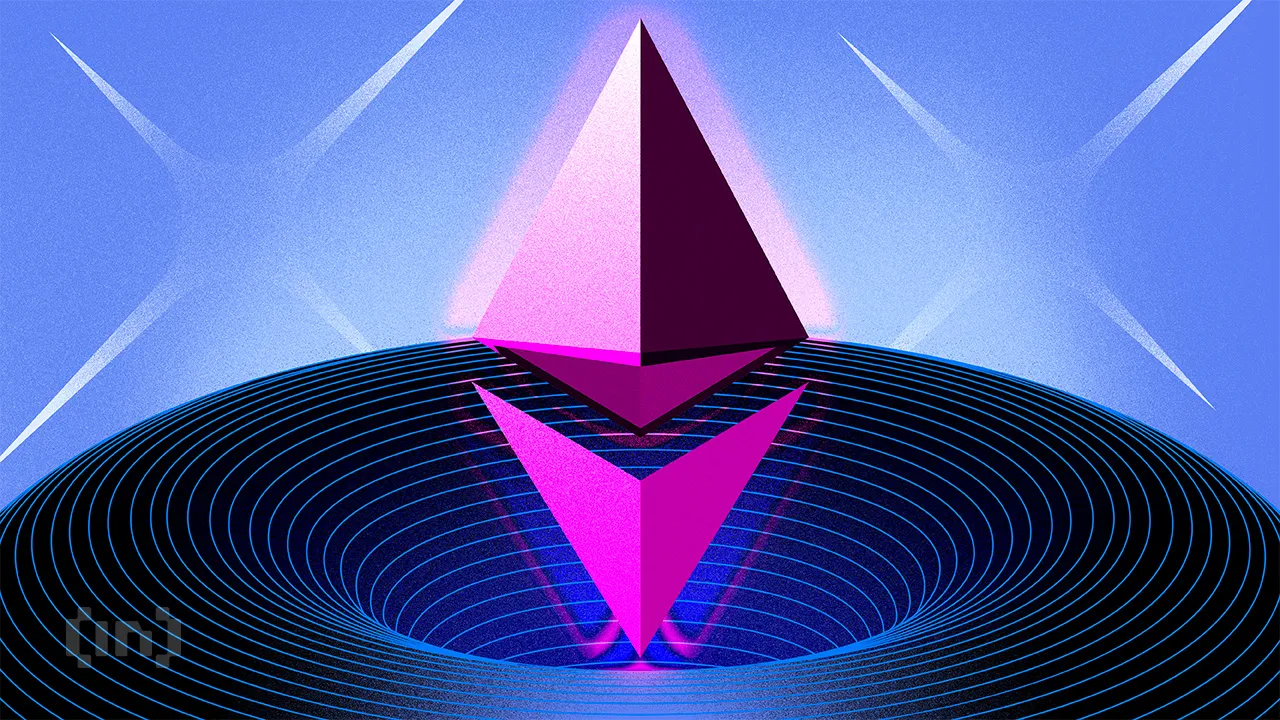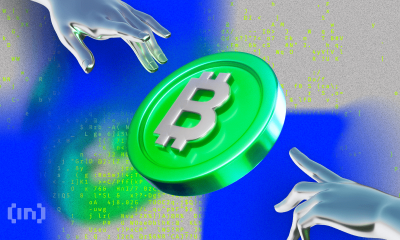Market
Fourth-Largest Swiss Bank Offers Bitcoin


BeInCrypto’s comprehensive Europe Crypto Roundup covers the latest news and trends shaping the continent’s crypto landscape. With reporters across key markets like Germany, France, and the UK, we provide in-depth insights into evolving regulatory environment, adoption rates, major industry events, and market movements.
This week’s roundup highlights Zürcher Kantonalbank’s new crypto service, the signing of the world’s first international AI treaty by the UK, EU, and US, along with other key stories.
German Police Issues Warning About New Bitcoin Scam
The Bavarian State Office of Criminal Investigation (LKA Bayern) has issued a warning about a new crypto fraud. Scammers have been leaving plastic bags around Munich with fake Bitcoin account access codes and payment receipts.
The scam involves eye-catching bags left in public areas like streets and park benches. Inside, victims find a receipt labeled “Bitcoin,” claiming to be worth 10,000 euros, along with a paper wallet — a slip of paper containing data for a crypto wallet, including a QR code.
Scanning the QR code redirects victims to a fake website that promises a payout in exchange for a 3% fee. However, the payment doesn’t go through, causing the person to lose money. Victims may attempt the process multiple times, compounding their losses.
Read more: 15 Most Common Crypto Scams To Look Out For
The LKA Bayern spokesperson warned that victims could unknowingly face legal repercussions. Scanning the QR code alone could be viewed as an attempt to fraudulently obtain someone else’s money, potentially resulting in charges of attempted fraud. Authorities will evaluate each case individually, but they recommend turning the bags in to the police immediately.
Investigators have not yet identified any suspects, and scammers seem to be distributing the paper wallets randomly in high-traffic areas, without a clear pattern. Authorities urge the public to remain cautious and report any suspicious findings to local law enforcement.
Switzerland’s Fourth-Largest Bank Launches New Crypto Service
Zürcher Kantonalbank (ZKB), Switzerland’s fourth-largest bank, has introduced a new service allowing retail customers to buy, sell, and hold Bitcoin and Ethereum. This offering is made possible through a collaboration with Crypto Finance, a digital assets broker owned by Deutsche Börse. Customers can access BTC and ETH via ZKB’s Mobile App, eBanking platform, and other existing channels, the bank announced in a press release on Wednesday.
Switzerland has long been a leader in the digital asset space, with many financial institutions providing cryptocurrency trading services. ZKB is no newcomer to crypto market. In 2021, the bank was involved in issuing the world’s first digital bond on Switzerland’s SIX Digital Exchange (SDX).
“When it comes to cryptocurrencies, Zürcher Kantonalbank takes on the critical function of securely storing the private keys,” said Alexandra Scriba, ZKB’s head of institutional clients and Multinationals. “Customers and third-party banks do not need their own wallet and therefore do not have to worry about storing their own private keys. Zürcher Kantonalbank takes care of both.”
Read more: Crypto vs. Banking: Which Is a Smarter Choice?
This new service also allows other Swiss banks to offer cryptocurrency trading and custody to their clients. Thurgauer Kantonalbank is the first partner bank to adopt the service.
EU, UK, and US Sign World’s First International AI Treaty
The US, EU, and UK signed the world’s first international AI treaty on September 5, aiming to protect human rights and hold AI systems accountable for any harm or discrimination they cause. While the treaty sets important standards, penalties like fines for violations haven’t been introduced yet.
“This Convention is a major step to ensuring that these new technologies can be harnessed without eroding our oldest values, like human rights and the rule of law,” Britain’s justice minister, Shabana Mahmood, said in a statement.
The European Union has already made significant progress in regulating AI with the AI Act, which came into effect in August. This new law will help control the development and use of advanced AI models, especially those with powerful computing capabilities. However, the act has been controversial.
Companies like Meta, which owns Facebook, claim the rules are too strict and are hurting innovation. In fact, Meta has paused the release of some of its latest AI products in Europe due to the complex regulations.
Read more: Top 9 Artificial Intelligence (AI) Cryptocurrencies in 2024
Despite these complaints, the EU is pushing ahead, setting a strong example for AI regulation. The AI Act is seen as a major step in ensuring that AI technologies are developed responsibly and safely, especially as more countries look to regulate this rapidly growing field. European leaders believe their approach will become a global benchmark for balancing technological advancement with ethical and legal protections.
French City Rouen Now Offers Bitcoin Payments for Groceries
France is seeing a growing number of businesses accepting cryptocurrency payments, with the latest addition being a supermarket in Rouen.
This week, Carrefour Express in Rouen made headlines by becoming one of the first supermarkets in France to accept Bitcoin. Customers can pay using the Swiss app Bridge Wallet, similar to Revolut, which facilitates crypto transactions. The system utilizes the Lightning Network to minimize transaction fees, making it fast and cost-effective.
Rouen isn’t alone in embracing crypto payments. While this may be a first for the city, several hundred establishments across France now accept cryptocurrencies. Major hubs like Paris, Nantes, and Lyon lead the way. In Lyon, initiatives like the Comptoir Brunet restaurant and Bitcoin Lyon broker are actively promoting crypto adoption.
Read more: The Best Bitcoin Lightning Network Wallets In 2024
With these developments, crypto payments are becoming more accessible across the country, bringing France closer to a future where digital currencies play a larger role in everyday transactions.
Disclaimer
In adherence to the Trust Project guidelines, BeInCrypto is committed to unbiased, transparent reporting. This news article aims to provide accurate, timely information. However, readers are advised to verify facts independently and consult with a professional before making any decisions based on this content. Please note that our Terms and Conditions, Privacy Policy, and Disclaimers have been updated.
Market
GOAT Price Sees Slower Growth After Reaching $1B Market Cap
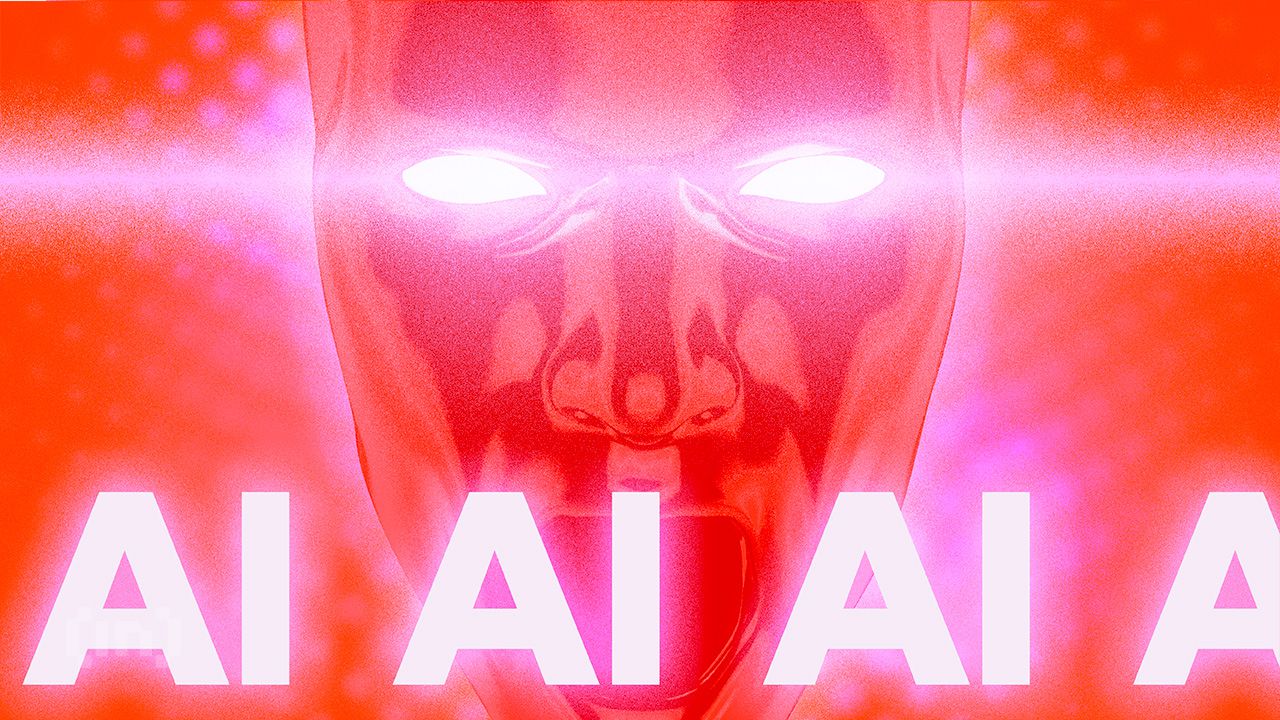
GOAT price has skyrocketed 214.29% in one month, recently breaking into the $1 billion market cap and securing its place as the 10th largest meme coin. It now stands just ahead of MOG, which closely trails its position in the rankings.
However, recent indicators suggest that GOAT’s uptrend may be weakening, raising questions about whether it can sustain its rally or face a potential correction.
GOAT BBTrend Is Negative For The First Time In 4 Days
GOAT BBTrend has turned negative for the first time since November 17, now sitting at -0.54. This shift suggests that bearish momentum is beginning to take hold, with the asset’s recent upward trajectory starting to weaken potentially.
BBTrend measures the strength and direction of price trends using Bollinger Bands, with positive values indicating an uptrend and negative values signaling a downtrend. A negative BBTrend reflects increased downward pressure, which could indicate the start of a broader market shift.

GOAT has had an impressive November, gaining 61% and reaching a new all-time high on November 17.
However, the current negative BBTrend, if it persists and grows, could signal the potential for further bearish momentum.
GOAT Is In A Neutral Zone
GOAT’s RSI has dropped to 52, down from over 70 a few days ago when it reached its all-time high. This decline indicates that buying momentum has cooled off, and the market has moved out of the overbought zone.
The drop suggests a shift toward a more neutral sentiment as traders consolidate gains and the strong bullish pressure seen earlier subsides.

RSI measures the strength and velocity of price changes, with values above 70 indicating overbought conditions and below 30 signaling oversold levels. At 52, GOAT’s RSI is in a neutral zone, neither signaling strong bullish nor bearish momentum.
This could mean the current uptrend is losing strength, and the price may consolidate or move sideways unless renewed buying pressure reignites upward momentum.
GOAT Price Prediction: A New Surge Until $1.50?
If GOAT current uptrend regains strength, it could retest its all-time high of $1.37, establishing its market cap above $1 billion, a fundamental threshold for being among the biggest meme coins in the market today.
Breaking above this level could pave the way for further gains, potentially reaching the next thresholds at $1.40 or even $1.50, signaling renewed bullish momentum and market confidence.
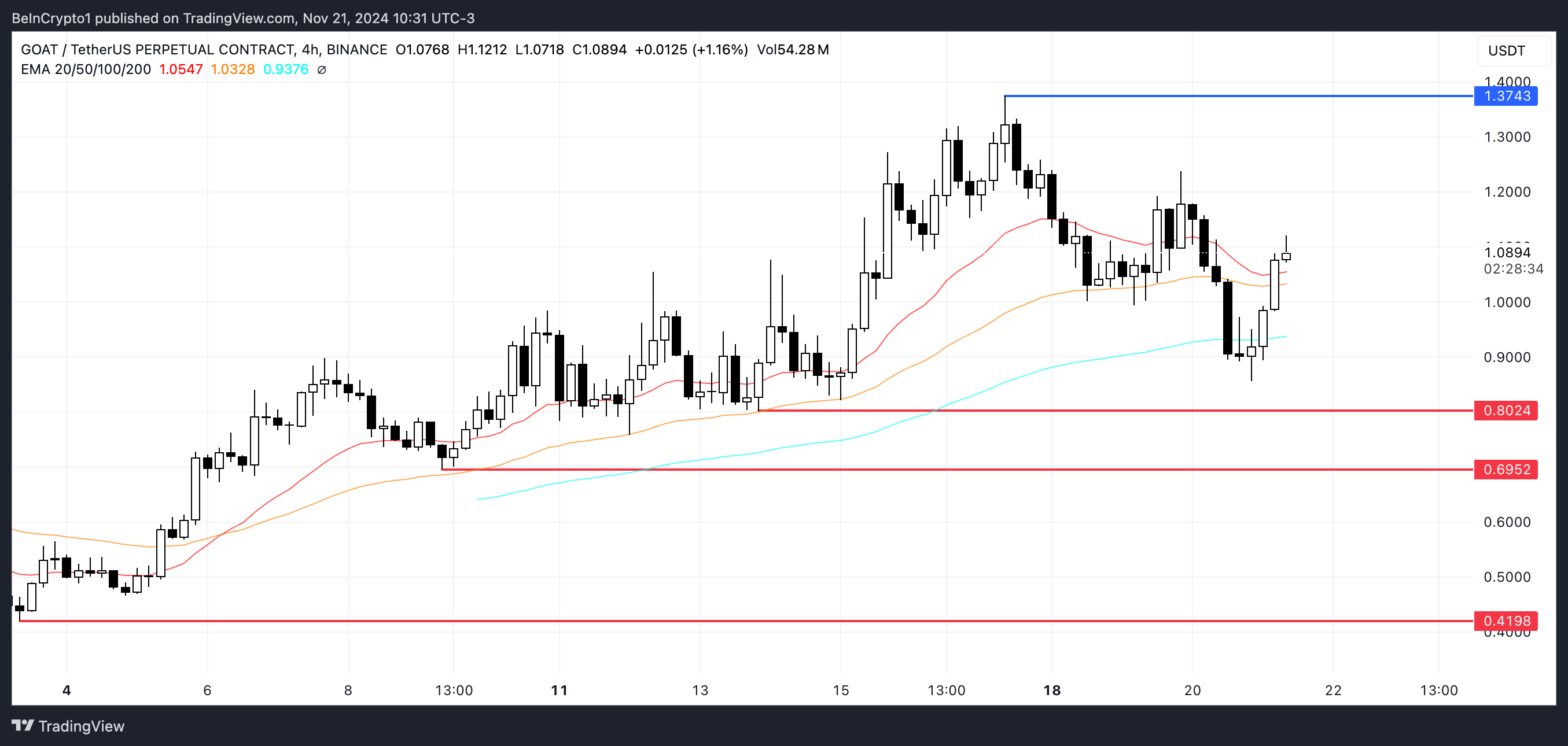
However, as shown by indicators like RSI and BBTrend, the uptrend may be losing steam. If a downtrend emerges, GOAT price could test its nearest support zones at $0.80 and $0.69.
Should these levels fail to hold, the price could fall further, potentially reaching $0.419, putting its position in the top 10 ranking of biggest meme coins at risk.
Disclaimer
In line with the Trust Project guidelines, this price analysis article is for informational purposes only and should not be considered financial or investment advice. BeInCrypto is committed to accurate, unbiased reporting, but market conditions are subject to change without notice. Always conduct your own research and consult with a professional before making any financial decisions. Please note that our Terms and Conditions, Privacy Policy, and Disclaimers have been updated.
Market
Ripple (XRP) Price Hits 109% Monthly Gain as Indicators Weaken
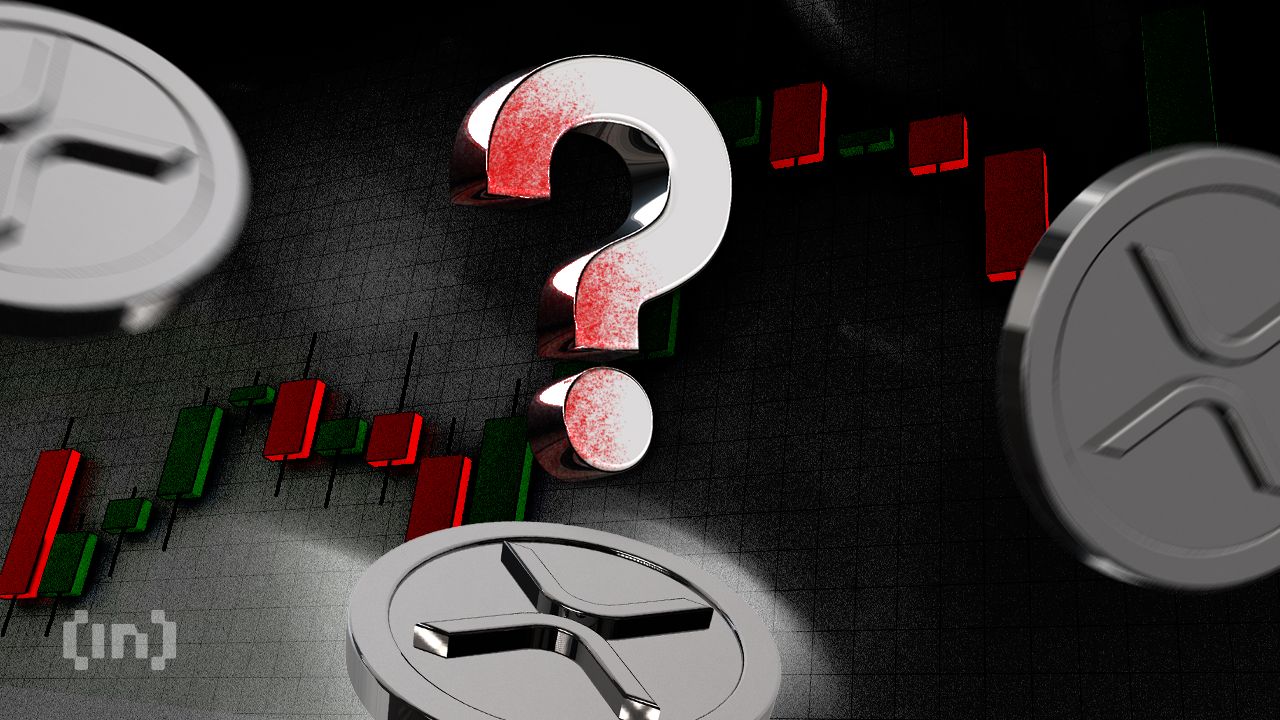
Ripple (XRP) price has experienced a significant rally, rising 51.33% in the last seven days and an impressive 109.09% over the past month. This strong momentum has propelled XRP into a bullish phase, with key indicators like EMA lines supporting its upward trajectory.
However, signs of weakening momentum, such as a declining RSI and negative CMF, suggest that caution may be warranted. Whether XRP continues to push higher or faces a steep correction will depend on how the market reacts to these shifting dynamics.
XRP RSI Is Below The Overbought Zone
XRP’s RSI has dropped to 60 after nearly hitting 90 on November 16 and staying above 70 between November 15 and November 17.
This decline indicates that Ripple has moved out of the overbought zone, where intense buying pressure previously drove its price higher. The drop suggests that the market is cooling off, with traders potentially taking profits after the strong rally.

The RSI measures the speed and magnitude of price changes, with values above 70 indicating overbought conditions and below 30 signaling oversold levels. At 60, XRP’s RSI reflects a still-positive momentum but shows a more balanced sentiment compared to the previous surge.
While the uptrend remains intact, the lower RSI could indicate a slower pace of gains, with the possibility of consolidation as the market stabilizes. If buying pressure returns, XRP price could extend its upward movement, but a further decline in RSI might signal a weakening bullish momentum.
Ripple CMF Is Now Negative After Staying Positive For 14 Days
XRP Chaikin Money Flow (CMF) is currently at -0.12, after showing positive levels between November 5 and November 19. That is also its lowest level since October 31. This shift into negative territory reflects increased selling pressure and a potential outflow of capital from the asset.
The transition from positive CMF values earlier this month signals a weakening in bullish momentum as more market participants reduce exposure to Ripple.

The CMF measures the volume and flow of money into or out of an asset, with positive values indicating capital inflow (bullish) and negative values showing capital outflow (bearish).
XRP’s CMF at -0.12 suggests that bearish sentiment is beginning to gain traction, potentially putting pressure on its price despite the recent uptrend. If the CMF remains negative or declines further, it could indicate sustained selling pressure, challenging Ripple’s ability to continue its upward movement.
Ripple Price Prediction: Biggest Price Since 2021?
XRP’s EMA lines currently display a bullish setup, with short-term lines positioned above the long-term lines and the price trading above all of them.
However, the narrowing distance between the price and some of these lines suggests a potential slowdown in bullish momentum. This could signal that the uptrend is weakening, leaving XRP price vulnerable to a shift in market sentiment.
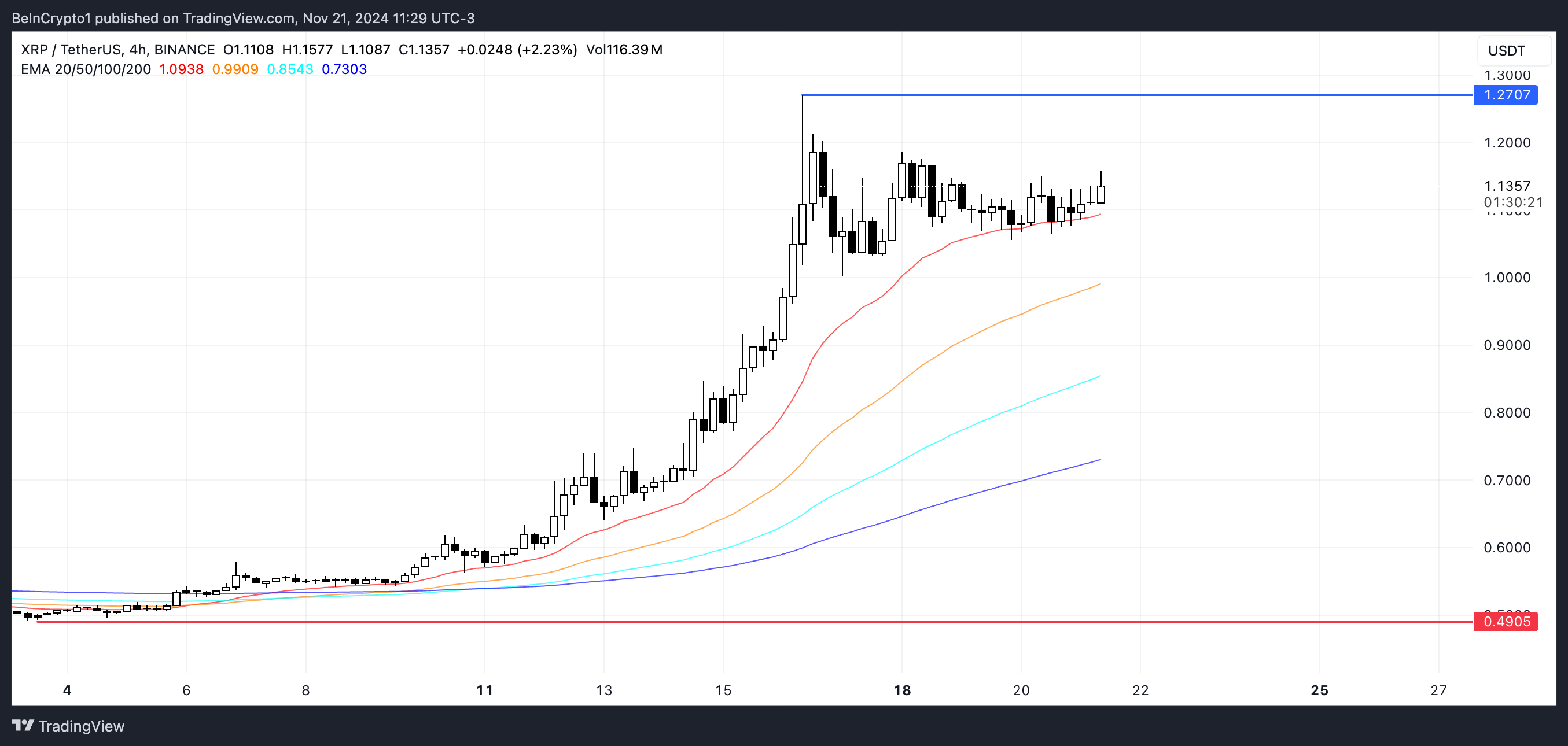
If a downtrend emerges, as indicated by the weakening RSI and negative CMF, Ripple price could face significant pressure and potentially drop to its support at $0.49, representing a substantial 56% correction.
On the other hand, if the uptrend regains strength, XRP could climb to test the $1.27 level and potentially break through to $1.30, which would mark its highest price since May 2021.
Disclaimer
In line with the Trust Project guidelines, this price analysis article is for informational purposes only and should not be considered financial or investment advice. BeInCrypto is committed to accurate, unbiased reporting, but market conditions are subject to change without notice. Always conduct your own research and consult with a professional before making any financial decisions. Please note that our Terms and Conditions, Privacy Policy, and Disclaimers have been updated.
Market
Trump Media Files Trademark for Crypto Platform TruthFi
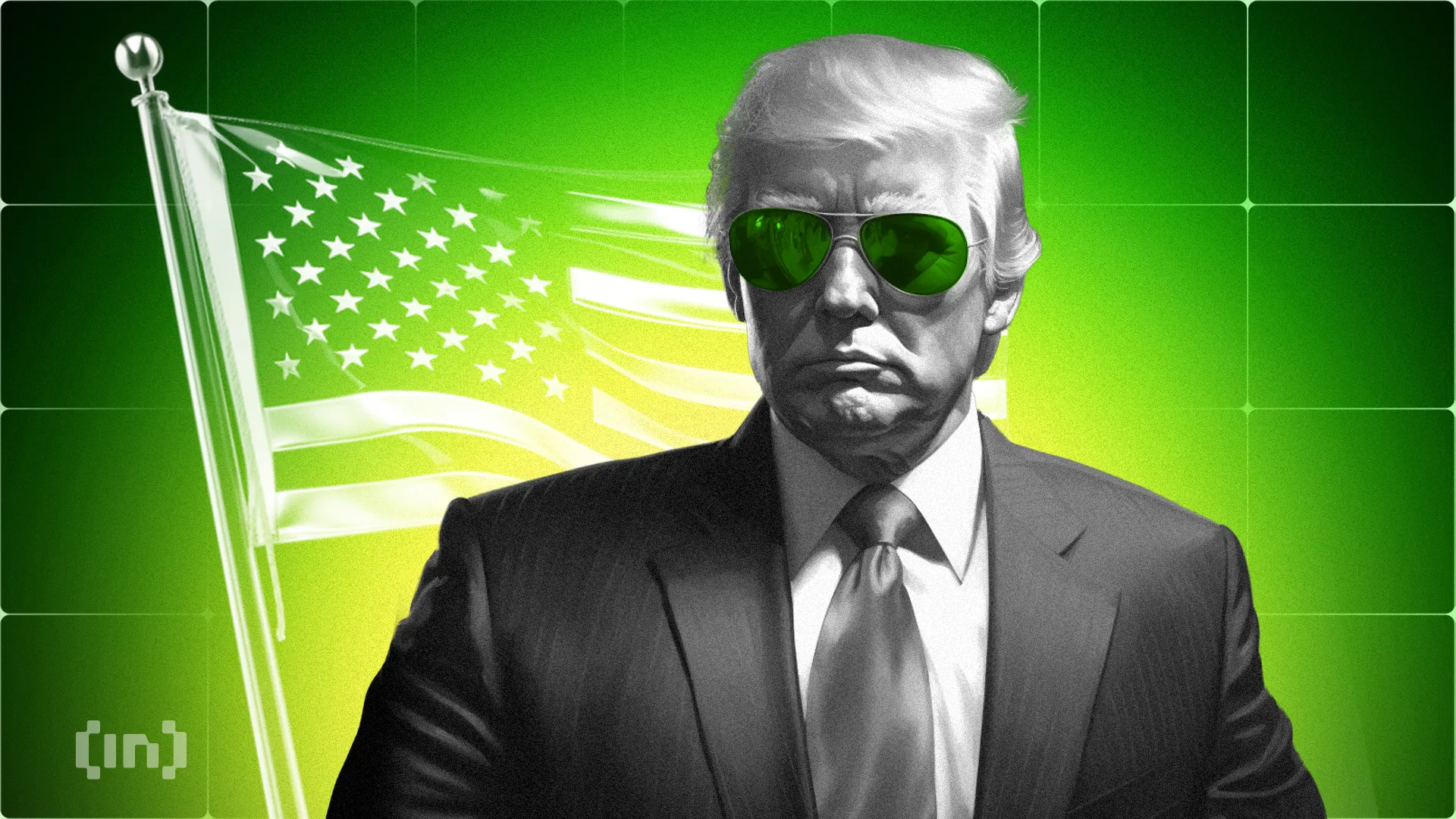
Trump Media & Technology Group is exploring the development of a crypto payment platform, as revealed by a recent trademark filing.
The application, submitted by Donald Trump’s social media company on Monday, outlines plans for a service named TruthFi. The proposed platform aims to offer crypto payments, financial custody, and digital asset trading.
Following the trademark announcement, Trump Media’s stock rose approximately 2%. At the time of writing, the stock was trading at $30.44, up by nearly 75% this year.
However, details about TruthFi remain scarce, including its timeline or operational specifics. This initiative suggests an effort by Trump Media to expand its business model beyond Truth Social.
The social media platform was established back in 2022, after Trump was banned from Facebook and X (formerly Twitter).
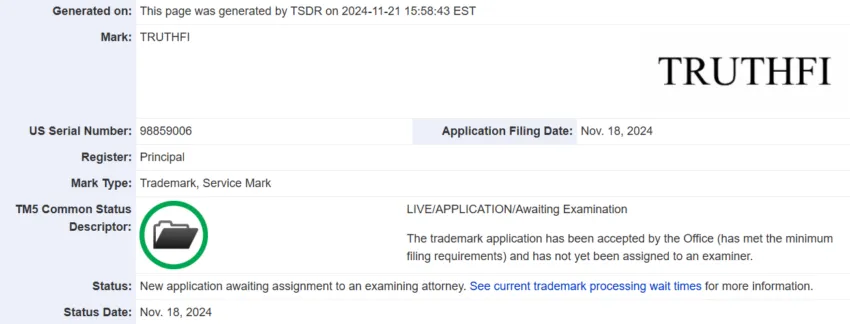
Nevertheless, launching a large-scale cryptocurrency platform could require Trump Media to acquire additional resources or partner with an established firm. This is because the firm currently has a small workforce of less than 40 employees.
“The filing, made with the USPTO on Monday, indicates that Trump Media plans to offer: Digital wallets, Cryptocurrency payment processing services, and A digital asset trading platform,” US Trademark Attorney Josh Gerben wrote on X (formerly Twitter).
As reported by BeInCrypto earlier, Trump Media is also in discussions to purchase the b2b crypto trading platform Bakkt. Shares in Bakkt surged by nearly 140% since the news earlier this week.
Meanwhile, the President-elect’s crypto plans seem to be in full swing even before he takes office in January. He is also reportedly considering the first-ever crypto advisor role for the White House, and interviewing several potential candidates.
Earlier today, the current SEC chair Gary Gensler announced his resignation before Trump’s term begins. Gensler’s resignation boosted the crypto market, as it signals a major change in the SEC’s regulatory stance.
Notably, XRP surged 7% to its highest value in three years. Bitcoin also neared $99,000, as the overall crypto market cap reached $3.4 trillion.
Disclaimer
In adherence to the Trust Project guidelines, BeInCrypto is committed to unbiased, transparent reporting. This news article aims to provide accurate, timely information. However, readers are advised to verify facts independently and consult with a professional before making any decisions based on this content. Please note that our Terms and Conditions, Privacy Policy, and Disclaimers have been updated.
-

 Market23 hours ago
Market23 hours agoThis is Why MoonPay Shattered Solana Transaction Records
-

 Ethereum20 hours ago
Ethereum20 hours agoFundraising platform JustGiving accepts over 60 cryptocurrencies including Bitcoin, Ethereum
-

 Market24 hours ago
Market24 hours agoSteady Climb Toward New Highs
-

 Altcoin22 hours ago
Altcoin22 hours agoBTC Reaches $97K, Altcoins Gains
-

 Market16 hours ago
Market16 hours agoSouth Korea Unveils North Korea’s Role in Upbit Hack
-

 Market21 hours ago
Market21 hours agoCardano’s Hoskinson Wants Brian Armstrong for US Crypto-Czar
-
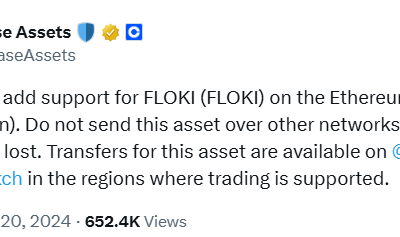
 Altcoin18 hours ago
Altcoin18 hours agoWhy FLOKI Price Hits 6-Month Peak With 5% Surge?
-

 Bitcoin11 hours ago
Bitcoin11 hours agoMarathon Digital Raises $1B to Expand Bitcoin Holdings


